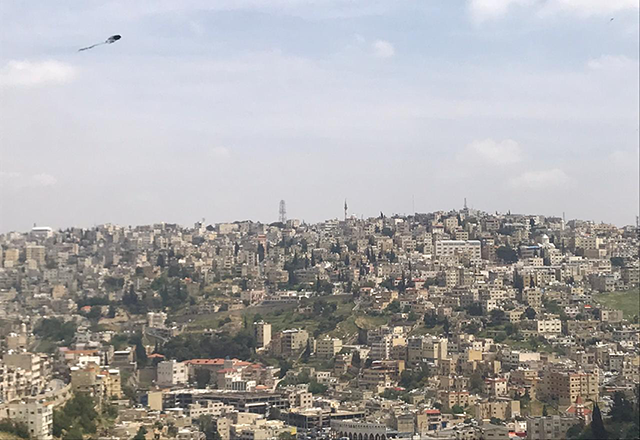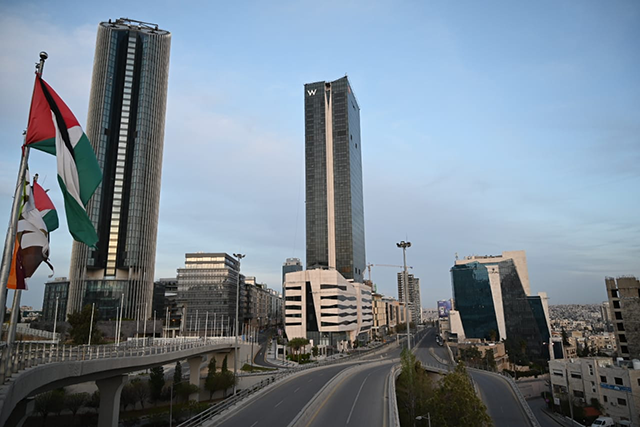You are here
Experts urge government to support women day labourers
By Rana Husseini - Apr 27,2020 - Last updated at Apr 27,2020

Experts have called on the government to establish a special fund to support women daily wage workers who were mostly affected by the lockdown, which came into force on March 21, necessitated by the coronavirus pandemic (Photo by Victoria Irene)
AMMAN – Former officials and economy experts called on the government to find mechanisms to support women day workers and others who work in the gray economy who were hit the most because of the COVID-19 pandemic.
During a virtual event, the experts called on the government to establish a special fund to support the female labourers’ sector that was mostly affected by the March 21 lockdown.
The event was organised by SADAQA organisation and Women in Business Arabia Network and titled: “Open dialogue via the ‘Women’s Workers Voice platform’ on women day workers in the gray economy”.
SADAQA Core Team Member Sahar Aloul said Women’s Workers Voice is a platform that is meant to convey the voices of women who work on daily basis during the COVID-19 crisis.
“The platform is for all the female employees who work on a daily basis or are enrolled in the gray economy sector, which does not guarantee financial stability, health insurance and other job securities,” Aloul explained.
“We want to raise awareness about the female labourers who suffered the most during these difficult times and hopefully a fund could be allocated to support this sector,” according to Aloul.
Former Planning and International Cooperation minister Mary Kawar added that the whole world is going through an economic recession.
“The Jordanian government is exerting exceptional efforts to contain the situation and I believe all countries were hit hard in many aspects, including the economy,” Kawar said.
The former minister added that one of the good things that came out of the COVID-19 crisis was awareness among the public about the important role of the Social Security Corporation (SCC) in supporting and protecting labourer’s during this difficult time.
“It became clear today that the SSC’s role is to support and protect various sectors in society and not to collect money,” the former minister said.
However, Kawar added that it was evident that “women in Jordan are finding it hard to reach certain services unlike men, so we need to acknowledge this problem and encourage the government to introduce practical solutions to help them reach the needed services that could help them on all levels”.
Also speaking during the event was former secretary general at the Ministry of Labour Hamad Abu Nijmeh, who said that during consultations with the government to deal with the COVID-19 crisis, "we provided the government with a proposal to establish a special fund in the SSC for daily workers with external funding during the transition period".
"Unfortunately, the government did not consider our suggestion until now," said Abu Nijmeh, who is specialised in labour affairs and rights.
Also speaking during the event were two women day workers who spoke about the economic effects of the COVID-19 lockdown on their lives, including Hairstylist Susan Jaouni who said: “The curfew overturned all her future plans and daily life since she is no longer able to leave the house to work.”
“We have many bills piling up and I had to use the savings for my son’s education since the income stopped,” Jaouni said.
Farmer Ilham Abbadi from a village in Jordan also said that her sector was hit hard since there are many women who work in the agriculture sector daily.
“Our sector should not be obliged to be enrolled in the SSC as our work is unstable and we do not have a steady income or use the electronic and technological platform, because not everyone knows how to use it,” Abbadi said.
Meanwhile, Nisreen Alami, an expert in women’s rights and economic policies and former policy adviser with UN Women and UNOCHA said the webinar on self-employed women and day workers was a very important opportunity to hear the voices of thousands of women who have been “invisible” in the media and in the eyes of policy makers and hopefully shedding light on their struggle will trigger the needed response.
“These women are a large segment of working women in Jordan who provide essential income and support to their families and communities, but nonetheless, have been excluded from the various programmes set up by government to provide protection to daily workers,” Alami told The Jordan Times.
Women who are struggling to make ends meet by establishing nurseries, beauty salons, food businesses, agricultural cooperatives or those working as domestic workers, tailors, or care providers for the elderly and people with disabilities and many other informal vocations work under very fragile conditions with low wages, without social security or health insurance and very insecure employment conditions, Alami added.
But now as “their businesses and jobs are faltering, and their families are losing a key source of income, those women have no recourse for support or protection”, according to Alami.
For those women, Alami maintained, their realities are much more complicated than that. They are often main breadwinners whose work sustains their families and children and often even their sickly or unemployed husbands.
“What we hope to see is a mechanism that pays attention to the needs of those working women by establishing a fund that would support them since they should be considered as productive members in the economy that the social security corporation can protect,” Alami stressed.
Related Articles
AMMAN – Economists on Thursday called on the government to adopt recommendations that came in an Economic and Social Council (ESC) report on
AMMAN — The definition of “the head of the household” should be expanded to include a larger set of social categories, particularly women, a
AMMAN — Prime Minister Bisher Al Khasawneh on Sunday mourned the death of former State Minister for Women Affairs Nadia Aloul, who died earl













